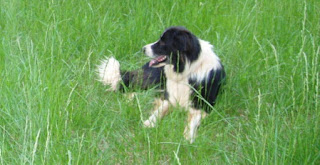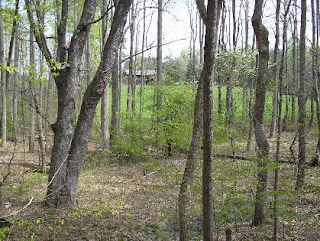Rain & Sunshine
Yesterday, rain fell in the front yard while the sun shone in the back yard. Today, it rained again while the sun shone.
Guess we'll have rain again tomorrow.
Ruminations on reading, writing, genealogy and family history, rural living, retirement, aging—and sometimes cats.
© 2006-2023 All rights reserved

I'm an elderly retired teacher who writes. Among my books are Ferradiddledumday (Appalachian version of the Rumpelstiltskin story), Stuck (middle grade paranormal novel), Patches on the Same Quilt (novel set in Franklin County, VA), Them That Go (an Appalachian novel), Miracle of the Concrete Jesus & Other Stories, and several Kindle ebooks.
DESCRIPTIVE PHRASES: Do not add an apostrophe to a word ending in s when it is used primarily in a descriptive sense: citizens band radio, a Cincinnati Reds infielder, a teachers college, Teamsters request, a writers guide.
Memory Aid: The apostrophe usually is not used if for or by rather than of would be appropriate in the longer form: a radio band for citizens, a college for teachers, a guide for writers, a request by the Teamsters.
An ’s is required, however, when a term involves a plural word that does not end in s: a children’s hospital, a people’s republic, the Young Men’s Christian Association.Many organizations—though not all—omit the apostrophe. Hence, we have the VirginiaWriters Club and the Valley Writers Chapter of the Virginia Writers Club.
The Moneta Lions Club celebrated the 18th anniversary of the club’s charter with Lions Clubs International with a formal dinner meeting June 21 at the Pointe at Mariners Landing in Huddleston.
With credit approval, for qualifying purchases made on a Sears card (Sears Commercial One® and Sears Home Improvement Account (sm) accounts excluded unless otherwise indicated).
The writer's group of manuscripts fell off his desk.or
The writer’s group, having only the writer himself as a member, met in a closet at the public library.
Labels: punctuation, writing


Labels: rural life
Beginning a Sentence with And or But
A frequently asked question about conjunctions is whether and or but can be used at the beginning of a sentence. This is what R.W. Burchfield has to say about this use of and:
There is a persistent belief that it is improper to begin a sentence with And, but this prohibition has been cheerfully ignored by standard authors from Anglo-Saxon times onwards. An initial And is a useful aid to writers as the narrative continues.
The same is true with the conjunction but. A sentence beginning with and or but will tend to draw attention to itself and its transitional function. Writers should examine such sentences with two questions in mind: (1) would the sentence and paragraph function just as well without the initial conjunction? (2) should the sentence in question be connected to the previous sentence? If the initial conjunction still seems appropriate, use it.
I can’t overstate how much easier it is for readers to process a sentence if you start with “but” when you’re shifting direction, or, conversely, how much harder it is if they must wait until the end to realize that you’ve shifted.
Many of us were taught that no sentence should begin with “but.” If that’s what you learned, unlearn it—there’s no stronger word at the start. It announces total contrast with what has gone before, and the reader is primed for the change. If you need relief from too many sentences beginning with “but,” switch to “however.” It is, however, a weaker word and therefore needs special placement. Don’t start a sentence with “however”—it hangs there like a wet dishrag. And don’t end with “however”—by that time it has lost its howeverness. Put it as early as you reasonably can—as I did three sentences ago. Its abruptness then becomes a virtue.
TOMBSTONE: It’s wrong to start a sentence with and or but.
R.I.P: But why’s it wrong? There’s no law against occasionally using and or but to begin a sentence.
Over the years, some English teachers have enforced the notion that and and but should only join elements within a sentence, not to join one sentence with another. Not so. It’s been common practice to begin sentences with them since at least as far back as the tenth century. But don’t overdo it, or your writing will sound monotonous.
A-student types who memorized everything their English teacher said insist that coordinating conjunctions cannot begin sentences. If editors ever try to feed you such wrongheadedness, throw these gems their way: And God said, Let there be light; and there was light (Courtesy, the Old Testament) Man is the only animal that blushes. Or needs to. (Courtesy, Mark Twain) And after all, the weather was ideal. They could not have had a more perfect day for a garden-party if they had ordered it. (Courtesy, Katherine Mansfield)There you have it: Several authorities say it’s OK to use “but” to start a sentence.
Labels: writing



Labels: nature




Labels: rural life



 Maggie spent part of Midsummer’s Eve in Standiford Creek on Smith Farm. Maggie loves flinging herself into a creek. She loves to get wet and muddy.
Maggie spent part of Midsummer’s Eve in Standiford Creek on Smith Farm. Maggie loves flinging herself into a creek. She loves to get wet and muddy.

We are very happy to inform you that your book is now officially published and will be uploaded to our web site by Friday afternoon. As a published author, you now have something in common with Dickens, Woolf, Kipling, Cummings, and Lawrence.
This means your book has been added to our web database and will be available for sale on our website within the next 24-48 hours. From this point forward, we are able to take orders from anyone who contacts us to order a book.
Labels: writing
Labels: writing

Labels: writing


Labels: writing


 The spring is the puddle at the lower right. The cabin is at the center.
The spring is the puddle at the lower right. The cabin is at the center. My books on the shelf in the green room at Cottage Curio.
My books on the shelf in the green room at Cottage Curio.Labels: writing
Labels: farming